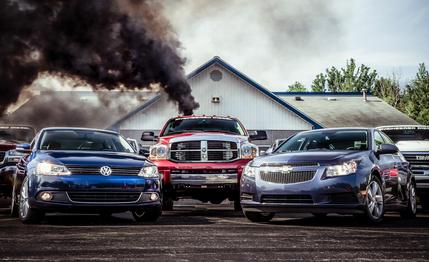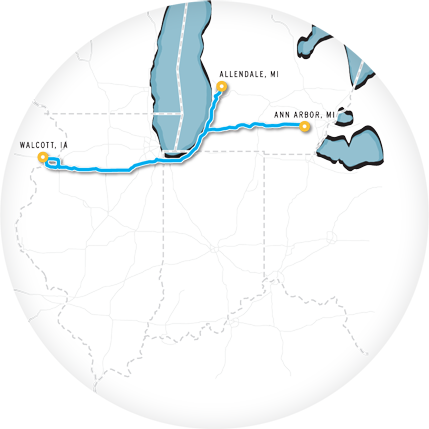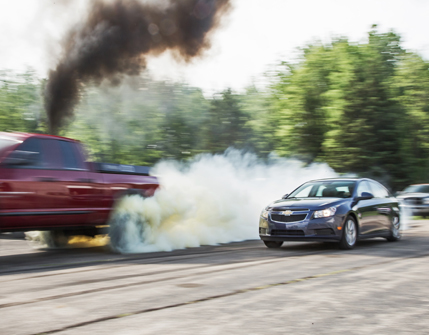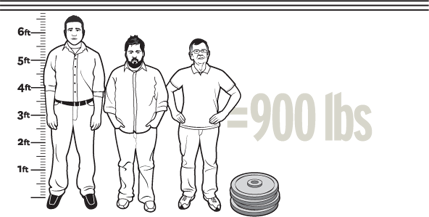
 Comparison Tests
Comparison Tests
There’s been a lot of talk lately about diesels finally taking hold in the U.S., but it’s bunk; they took hold long ago. There’s a National Hot Rod Diesel Association, in which diesel dragsters run in the sixes at more than 200 mph. A diesel has topped 350 mph at Bonneville. The Ram pictured above “rolling coal” (soot-head slang for blasting a black cloud from the exhaust) makes a claimed 925 horsepower and 1800 pound-feet of torque. At the wheels.
Volkswagen’s humble Jetta TDI can’t match those figures, but since the late 1980s, it’s been holding on to one of the most treasured numbers in the automotive industry: zero. As in zero direct competitors. Having a segment to itself is every automaker’s dream, and last year, Volkswagen leveraged that zero into 29,805 sales.
With interest in diesel cars growing due to rising fuel-economy awareness, GM has stuffed the 2014 Cruze compact with a 2.0-liter diesel from its Opel parts bin, added a urea-injection system to meet U.S. emissions regulations, and plopped it down right across from Volkswagen’s banana stand. Its 151 horsepower beats the VW’s by 11, and its 280 pound-feet of torque beats VW’s count by 44. In the minus column are the Chevrolet’s extra 232 pounds, due in part to the urea exhaust-treatment equipment, which the Jetta lacks (it’s clean enough to meet our emissions standards without it). Chevy hangs a higher price tag on the Cruze but throws in more standard gear, including an automatic transmission.
To commemorate the arrival of the Jetta TDI’s first real competitor in decades, we put together a quartet of tests to measure how well these two diminutive diesel sedans fulfill traditional compression-ignition-type roles. Then, because it’s what we do, we evaluated them as normal cars, too.
Extracurricular Activities Here in the U.S., diesels are workhorses. This battery of tests was designed in small part to evaluate our two diesel cars' suitability for working roles and in large part for our own amusement.
 Test 1: Range
We set out to verify these cars' lofty highway-fuel-economy ratings—42 mpg for the Jetta, 46 for the Cruze—by driving from our Ann Arbor headquarters to the world's largest truck stop in Walcott, Iowa. After that 409-mile drive, the Jetta was still 200 miles from empty and the Cruze more than 300, so we turned around and headed for Engineered Diesel in Allendale, Michigan, where we found the particularly rude Ram pictured in this story. From Allendale, we set a course for New Holland Brewery in Holland, Michigan, where the Poet Stout is as dark—but not quite so smoky—as diesel exhaust. We didn't make it.
Test 1: Range
We set out to verify these cars' lofty highway-fuel-economy ratings—42 mpg for the Jetta, 46 for the Cruze—by driving from our Ann Arbor headquarters to the world's largest truck stop in Walcott, Iowa. After that 409-mile drive, the Jetta was still 200 miles from empty and the Cruze more than 300, so we turned around and headed for Engineered Diesel in Allendale, Michigan, where we found the particularly rude Ram pictured in this story. From Allendale, we set a course for New Holland Brewery in Holland, Michigan, where the Poet Stout is as dark—but not quite so smoky—as diesel exhaust. We didn't make it.

 Test 2: Smoke Generation
Neither of our EPA-certified four-cylinders could roll coal, so we had a burnout contest instead. The Jetta couldn't manage a whisp of smoke until we tied it to an immovable object. Then it showed off its inner teen and snatched the win.
Test 2: Smoke Generation
Neither of our EPA-certified four-cylinders could roll coal, so we had a burnout contest instead. The Jetta couldn't manage a whisp of smoke until we tied it to an immovable object. Then it showed off its inner teen and snatched the win.

 Test 3: Shrub Pulling
Stump-pulling is among the burliest truck tasks extant. For these compact sedans, we subbed in shrubs for stumps. The author neglected to warn his wife before modifying their landscaping. Fortunately, she's a good sport. The Jetta won here.
Test 3: Shrub Pulling
Stump-pulling is among the burliest truck tasks extant. For these compact sedans, we subbed in shrubs for stumps. The author neglected to warn his wife before modifying their landscaping. Fortunately, she's a good sport. The Jetta won here.

 Test 4: Heavy Hauling
Today's diesel dualies can handle payloads upward of 7000 pounds. We had to aim a little lower. The Jetta's half-ton cargo limit surpasses the Chevy's max load by 100 pounds, so we loaded both up with 900 pounds of staffer and ballast and conducted our usual 70–0-mph braking test. The Jetta stopped shorter but faded so much that we called it a Cruze victory.
Test 4: Heavy Hauling
Today's diesel dualies can handle payloads upward of 7000 pounds. We had to aim a little lower. The Jetta's half-ton cargo limit surpasses the Chevy's max load by 100 pounds, so we loaded both up with 900 pounds of staffer and ballast and conducted our usual 70–0-mph braking test. The Jetta stopped shorter but faded so much that we called it a Cruze victory.